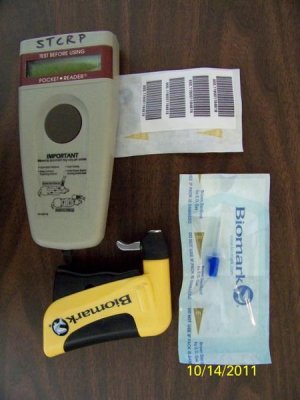Grant: 11-028R
Project Title: Southwest Florida loggerhead rookeries as a collaborative tagging experiment
Project Manager: Dr. Tony Tucker
Organization: Mote Marine Laboratory (Non-Profit Organization)
Grant Amount: $7,040.00
Completion Date: 2012-01-25
Summary: Three loggerhead rookeries of Southwest Florida have ongoing tagging projects of 20 years or more (Casey Key, Manasota Key, and Keewaydin Island). Passive Induced Transponder (PIT) tagging commenced in 2000 on Casey Key, and in 2007 for Manasota Key and Keewaydin Island. These projects employed PIT tagging for its benefits of superior tag retention, in addition to standard double tagging with Inconel flipper tags. This project is for years 4-6 of a six year collaborative tagging experiment by three Southwest Florida loggerhead rookeries to improve estimates of survivorship, tag loss, and nest site fidelity. The project will provide a pool of PIT tagging resources to be allocated regionally in 2011-2013 Results: The three tagging studies are ongoing and the levels of PIT tag retention show significant progress toward a 2013 end goal of saturation tagging of all remigrants, with a 90% level of retention. The 2011 data indicated that collectively the 3 rookeries sustained a 93% level of PIT tag retention (8 PIT tags were lost or unread among 116 remigrants that had previously received PIT tags = 108/116 or 93%). Tag-scarred individuals that were identified by PIT tags were 22% (25/116). These two offsetting factors (-7% lost or misread versus 22% retained as tag histories with PIT tags despite loss of flipper tags) suggest that a 15% net increase was being documented by a 4th year of this collaborative PIT tagging project. As many PIT identified females have yet to return from a 4+ year remigration interval, it is reasonable to project further sustained increases through to 2013 and beyond. An estimated 15% net increase of the proportion of remigrants with PIT tags should be anticipated for the next remigration interval.
Results: The three tagging studies are ongoing and the levels of PIT tag retention show significant progress toward a 2013 end goal of saturation tagging of all remigrants, with a 90% level of retention. The 2011 data indicated that collectively the 3 rookeries sustained a 93% level of PIT tag retention (8 PIT tags were lost or unread among 116 remigrants that had previously received PIT tags = 108/116 or 93%). Tag-scarred individuals that were identified by PIT tags were 22% (25/116). These two offsetting factors (-7% lost or misread versus 22% retained as tag histories with PIT tags despite loss of flipper tags) suggest that a 15% net increase was being documented by a 4th year of this collaborative PIT tagging project. As many PIT identified females have yet to return from a 4+ year remigration interval, it is reasonable to project further sustained increases through to 2013 and beyond. An estimated 15% net increase of the proportion of remigrants with PIT tags should be anticipated for the next remigration interval.